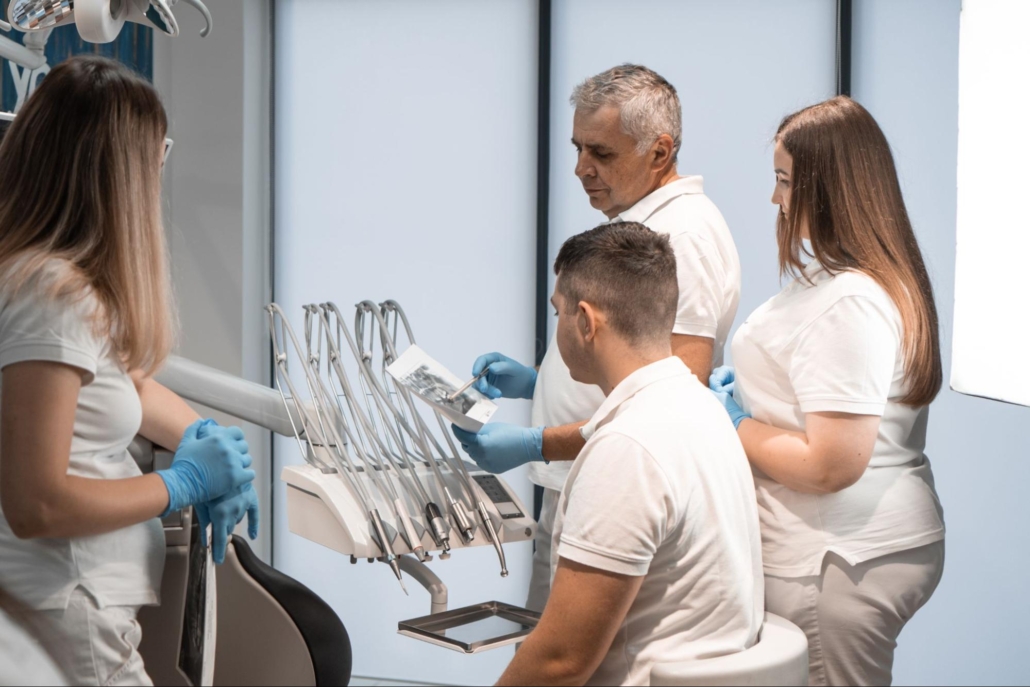What You Need to Know About Cavitation Surgery in Dentistry
Cavitation surgery, also known as cavitation treatment or cavitation therapy, is a procedure gaining attention in dentistry for its potential to address specific oral health issues. While relatively lesser known than other dental procedures, cavitation surgery is crucial in treating conditions associated with jawbone cavitation or cavities.
Before considering this dental treatment option, this article will help readers understand cavitation surgery, its purposes, benefits, and what to know. Understanding cavitation surgery can empower you to make informed decisions about your oral healthcare journey.
What Is Cavitation Surgery in Dentistry?
Cavitation surgery, also known as jawbone or cavitation treatment, addresses necrotic or infected areas in the jawbone that typically result from poor healing after dental extractions, root canals, or other oral surgeries. These cavitations can go unnoticed for years, causing chronic inflammation and pain and contributing to various systemic health issues. The procedure involves a dentist or oral surgeon removing the necrotic or infected tissue through a small incision in the gum tissue, thoroughly cleaning the area, and sometimes using additional treatments like ozone therapy or platelet-rich plasma (PRP) to promote healing and prevent further infection.
Minimally invasive techniques, such as laser surgery or ultrasound instrumentation, are commonly employed in cavitation surgery to minimize trauma to surrounding tissue and facilitate faster healing. The primary goal is to remove diseased tissue, stimulate new bone growth, and restore proper blood flow to the area, allowing the jawbone to heal and regenerate.
Differences Between Cavitation and Traditional Surgeries
Cavitation surgery differs from traditional dental procedures in several key ways, particularly in its focus on addressing underlying bone pathology and promoting optimal healing.
Here are some of the main differences between cavitation surgery and traditional dental treatments:
Targeted Treatment Approach
Cavitation surgery explicitly targets areas of necrotic or infected bone tissue within the jawbone. In contrast, traditional dental procedures focus on addressing issues with teeth or soft tissues in the oral cavity.
Minimally Invasive Techniques
Cavitation surgery often employs minimally invasive techniques, such as laser surgery or ultrasonic instrumentation, to access and clean the cavitation site. In contrast, traditional dental procedures may involve more invasive approaches, such as dental extractions or root canal therapy.
Focus on Bone Healing
Unlike traditional dental procedures that primarily treat symptoms or restore tooth structure, cavitation surgery prioritizes bone healing and regeneration. By removing diseased tissue and stimulating new bone growth, cavitation surgery aims to restore proper function and integrity to the jawbone.
Prevention of Systemic Health Issues
Cavitations in the jawbone have been associated with various systemic health issues, including chronic fatigue, autoimmune disorders, and neurological conditions. Cavitation surgery addresses these underlying issues by removing the source of infection and inflammation, potentially improving overall health outcomes.
Cavitation surgery offers a unique approach to addressing oral health issues related to jawbone cavitations, promoting healing, and preventing further systemic health issues. While traditional dental procedures play a crucial role in maintaining oral health, cavitation surgery provides a specialized treatment option for individuals with chronic jaw pain or systemic health issues associated with cavitations.
 Risks Associated With Cavitation Surgery
Risks Associated With Cavitation Surgery
While cavitation surgery is generally considered safe and effective, it carries some inherent risks like any medical procedure. Some potential risks associated with cavitation surgery include:
Infection
There is a risk of infection at the surgical site, especially if proper sterilization techniques are not followed during the procedure. To address this risk, dentists and oral surgeons adhere to strict infection control protocols, including the use of sterile instruments and aseptic techniques.
Bleeding
Bleeding is a common risk associated with any surgical procedure. Dentists may use local hemostatic agents or sutures to control bleeding during and after cavitation surgery.
Nerve Damage
There is a small risk of nerve damage, particularly if the surgical site is in close proximity to nerves in the jawbone. Dentists use precise techniques to minimize the risk of nerve damage and carefully assess the anatomy of the jawbone.
Persistent Pain or Discomfort
Some patients may experience persistent pain or discomfort following cavitation surgery, especially if there are underlying issues such as chronic inflammation or nerve irritation. Pain management strategies, such as medications or alternative therapies, may be recommended to address this risk.
Failure to Resolve Symptoms
In some cases, cavitation surgery may not fully resolve the symptoms associated with jawbone cavitations, such as chronic pain or systemic health issues. Additional treatments or follow-up care may be necessary to address persistent symptoms and ensure optimal healing.
To address these risks, patients must undergo a thorough evaluation and consultation with a qualified dental professional before undergoing cavitation surgery. Dentists and oral surgeons will assess the patient’s medical history, perform diagnostic tests, and discuss the potential risks and benefits of the procedure. Patients are required to follow post-operative care instructions carefully and attend follow-up appointments to monitor healing and promptly address concerns.
Timeline of the Recovery Process After Cavitation Surgery
The recovery process after cavitation surgery can vary depending on the extent of the procedure, the patient’s overall health, and individual factors. In general, most patients can expect the following timeline for recovery:
Immediately Post-Operative
Patients may experience some discomfort, swelling, and bruising immediately after cavitation surgery. Pain medications and cold compresses can help alleviate discomfort and reduce swelling during this initial period.
First Week
Patients should focus on rest and proper oral hygiene during the first week after surgery. They should also follow any dietary restrictions and avoid strenuous activities that may disrupt healing.
Two Weeks
By the end of the second week, most patients experience significantly reduced swelling and discomfort. Some patients may still have mild residual symptoms, but overall, healing progresses steadily.
Four to Six Weeks
At this stage, most patients are expected to fully recover from cavitation surgery and resume normal activities and dietary habits. However, attending follow-up appointments with the dentist or oral surgeon is essential to monitor healing and address any concerns.
Adhere to all post-operative instructions provided by their dental professional to promote optimal healing and minimize the risk of complications. To keep the surgical site clean and infection-free, patients should continue to practice good oral hygiene, which includes gentle brushing and rinsing with salt water or prescribed mouthwash. If any unusual symptoms or complications arise during recovery, patients should contact their dentist or oral surgeon for guidance and assistance.
 Is Cavitation Surgery Right for You?
Is Cavitation Surgery Right for You?
Cavitation surgery, also known as cavitation cleaning or osteonecrosis surgery, is gaining attention in dentistry. It involves the removal of diseased or necrotic bone tissue, particularly in areas where previous dental procedures, such as extractions or root canals, have left behind infections or inflammatory lesions. While it may not be a commonly discussed option, cavitation surgery can benefit certain individuals significantly.
Who Should Consider Cavitation Surgery?
Cavitation surgery offers a solution for individuals experiencing persistent dental pain, particularly in areas previously subjected to dental procedures like extractions or root canals. Those with a history of extensive dental work or unresolved dental issues may find relief through this procedure, which aims to remove diseased or necrotic bone tissue in the jawbone. Other factors that may qualify an individual to undergo cavitation surgery are the following:
Persistent Dental Pain
Cavitation surgery may benefit people with persistent or inexplicable pain in areas where prior dental work was done. Symptoms like swelling, tenderness, or difficulty chewing may accompany this pain.
History of Dental Procedures
Patients with a history of extensive dental work, including extractions, root canals, or dental implants, are at higher risk of developing cavitations. The risk of cavitation formation rises if these procedures are carried out in less-than-ideal circumstances or without appropriate follow-up care.
Systemic Health Concerns
According to some research, there may be a connection between certain systemic health issues like chronic fatigue syndrome, autoimmune diseases, cardiovascular disease, and oral health, including cavitations. Cavitation surgery may benefit those with these conditions by addressing possible sources of oral inflammation.
Failed Dental Treatments
Patients who have experienced failed or unresolved dental treatments, such as persistent infections or complications following dental procedures, may find relief through cavitation surgery. Cavitation surgery attempts to facilitate appropriate healing and avert additional complications by treating underlying problems in the jawbone.
Consultation With a Qualified Professional
As with any dental procedure, it’s essential to consult with a qualified and experienced dentist or oral surgeon to determine whether cavitation surgery is appropriate for your specific situation. They can thoroughly evaluate your dental and medical history, perform necessary diagnostic tests, and discuss treatment options tailored to your needs.
Cavitation surgery can be a valuable tool in addressing underlying issues in the jawbone that may contribute to oral and systemic health problems. It may be helpful to discuss the possibility of cavitation surgery with your dentist or oral surgeon if you have chronic dental pain, have had extensive dental work done in the past, or are concerned about the state of your oral and general health. Cavitation surgery aims to restore optimal oral health and overall well-being by treating these unseen sources of inflammation.
Understanding Cavitation Surgery in Dentistry
Knowing the basics of cavitation surgery in dentistry clarifies its importance in treating underlying problems with the jawbone and enhancing oral health. This specialized procedure offers a targeted approach to treating cavitations, helping to alleviate chronic pain, inflammation, and systemic health issues associated with jawbone pathology. While cavitation surgery carries inherent risks like any surgical procedure, its benefits in restoring proper bone health and function make it a valuable treatment option for individuals seeking long-term relief and improved overall well-being. Through the guidance of a skilled dental practitioner and strict adherence to post-operative care guidelines, patients can effectively manage the cavitation surgery procedure, leading to improved oral health and a happier, more contented existence.
Explore the Frederick Dreher DDS PC blog for expert insights, helpful tips, and valuable resources to empower your journey toward optimal oral health and a brighter smile.






Leave a Reply
Want to join the discussion?Feel free to contribute!